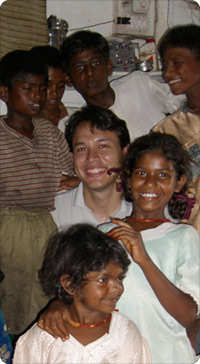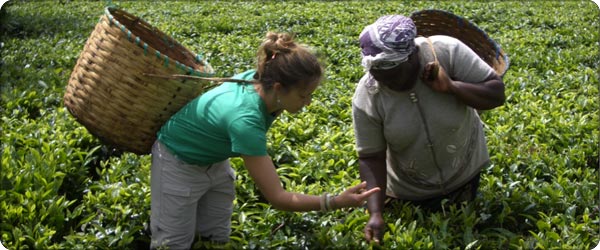
BRINQ is the home of entrepreneur and product designer Patrick Donohue, whose work focuses on high impact startups and products.
Homestays are a powerful tool to begin a community-based entrepreneurial effort, but they need to be approached with tremendous humility and planning.

In 2006, I spent a week living with a family in the Indiramma Nagar slum cluster of the city of Hyderabad. Sheik Baba and Sultana – along with their four children, mother, and niece – hosted me in their small, single room home by the airport wall. Baba and Sultana were perfect hosts. They opened their small home to me and I greatly enjoyed the time I spent with them: despite the extreme heat of the Indian summer (115 °F) and our limited means of communication.
Weeks later while working with our business partners (a group of local women in the slum), a colleague brought up the fact that I had stayed with Baba and Sultana. There was a stir of comments among the women.
"What is it?" I asked.
"The family is very poor,” my colleague translated, “they are surprised that you could stay with them.”
They were particularly surprised that I didn't mind eating and drinking with the family: Westerners aren't normally known for very strong stomachs. To be honest, I had been a bit concerned when Sultana handed me that first cup of water, but it hadn't really seemed practical to refuse. Did I mention how hot it was? After the first cup went down though, and stayed down, I accepted plenty more.
In fact, besides my almost comical trait of not being able to eat without crying – no matter how little spice Sultana tried to cook with – everything had gone great. I had made friends and experienced a side of the community that few outsiders ever get to see. Plus, most of these women who we were building a new business with had met us as a result our team's homestays. Introductions had led to introductions, but it had all started there in the community.
Quite a productive week.
A homestay, where you are a houseguest of a community member or family, is an extremely powerful tool for beginning an engagement in the Base of the Pyramid. The potential trust, respect, and knowledge that blossoms from taking part in the life of a BoP household can be nothing short of incredible. "Transformational”, “the single most important activity we’ve done”, and “an accelerated form of relationship-building” are all phrases used by BoP Protocol teams to describe their experiences.
At the same time, relatively few NGOs in the BoP and even fewer companies ever use this type of immersion to jumpstart new initiatives. The most common excuses to avoid homestays seem to center around the potential for discomfort and misunderstanding, and the truth is that homestays do involve discomfort and misunderstanding, for all parties. So while homestays are a powerful tool to build relationships and understanding, they need to be approached with tremendous humility and planning.
For entrepreneurial processes like the BoP Protocol, homestays are less about ethnography, where you seek to acquire inside knowledge, and are more about building relationships to start a new enterprise and market. In this light, the key objectives of a homestay are:

Homestays can be a daunting, even scary, concept for an outsider and even locally established partners often express skepticism about a team’s ability to live in the community. In both Kenya and India, our team members expressed worries over personal security, health, comfort, and communication, as well as concerns for burdens placed on the host families in financial terms, security (over thieves’ belief that the team member might have brought money or valuables to the host’s home), or religious, ethnic, and gender terms (Hindus living with Muslims, Kikuyus with Nubians, or men staying with families with daughters).
Local partners were worried that we wouldn’t be able to give up the comforts of the modern world (air conditioning, beds, Western toilets, etc.), would expect preferential treatment, or could not handle day-to-day life in a poor community. In India, parents of some our teammates (who were well into their 30’s) prohibited them from staying in a slum at night. Finally, it can often be confusing to know the reasons why an outsider is staying in the community, and rumors (sometimes wild ones) are likely.
It’s also important that the team understand that normal social conventions between people of different class levels in a community have developed for a reason. This is especially true between those providing a service and those that are being served. Often these conventions act as a shield to protect both parties from the other, providing clearly defined roles and etiquette to minimize misunderstandings.
The challenge of a homestay (and indeed of the BoP Protocol itself) is to create a safe space in which to shift those conventions around, creating opportunities for new relationships to form, while using constant dialogue and shared activities to work through the inevitable misunderstandings.
Part 2 will cover how to choose and prepare for a homestay.